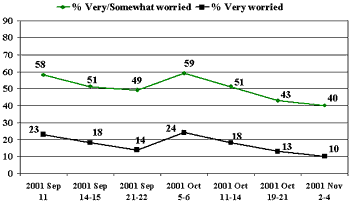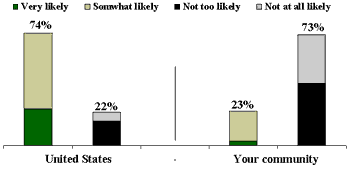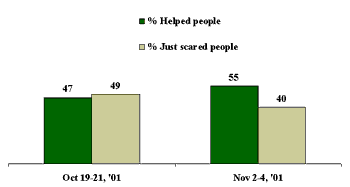GALLUP NEWS SERVICE
PRINCETON, NJ -- Nearly two months after the Sept. 11 terrorist attacks, Americans are still adjusting to life during the war on terrorism. The latest CNN/USA Today/Gallup poll shows that 40% of Americans are at least somewhat worried about becoming the victim of a terrorist attack. This is, however, the lowest level of concern measured by Gallup since the Sept. 11 attacks, and comparable to public concern over terrorism in the wake of the 1995 bombing in Oklahoma City.
Despite the drop in overall concern about personally being victimized by terrorism, nearly three-quarters believe that future terrorist attacks on American soil are at least somewhat likely in the next several weeks, although this number, too, has shown some decline in recent weeks. Americans generally believe that government warnings of possible terrorist attacks are more beneficial than harmful, and would rather the government issue a vague warning rather than no warning at all.
Concern About Being Terrorist Victim Declining
According to the poll, conducted Nov. 2-4, 40% of the public is at least somewhat worried about being victimized by a terrorist attack, including 10% who are very worried. Both of these numbers are at their lowest point since the Sept. 11 attacks. Currently, 31% say they are "not at all worried" about being a victim, nearly twice as many as on the night of the attack (16%).
| How worried are you that you or someone in your family will become a victim of a terrorist attack -- very worried, somewhat worried, not too worried, or not worried at all? |
 |
| Nov. 2-4, ‘01 |
Polling from Sept. 11 to mid-October showed roughly half the public saying they were at least somewhat worried about being victimized. The level of concern peaked at 59% in an Oct. 5-6 Gallup survey, but by mid-October had dropped to 43%. Women are still more likely to fear becoming a terrorist attack victim, as 50% of women are concerned compared to only 31% of men. This is roughly the same gap that existed in the Oct. 11-14 poll, at which time concern was 61% among women and 40% among men.
Fewer Think Future Acts of Terrorism Very Likely
Public concern about the possibility of further terrorist attacks is also declining, although a majority of Americans still believe that more attacks are possible. The percentage of Americans who say that further acts of terrorism in the United States are at least somewhat likely has dropped to 75% from an 85% reading in an Oct. 19-21 poll. Currently, 24% think future attacks are very likely, as did 40% in the previous survey.
When asked about the likelihood of acts of terrorism occurring in their communities, Americans show a great deal less concern. Just 23% say it is at least somewhat likely, including 3% who say it is very likely.
| How likely is it that there will be further
acts of terrorism in the United States over the next several weeks
-- very likely, somewhat likely, not too likely, or not at all
likely?
How likely is it that there will be further acts of terrorism in YOUR COMMUNITY over the next several weeks -- very likely, somewhat likely, not too likely, or not at all likely? |
 |
| Nov. 2-4, ‘01 |
Those living in the South (33%) and East (25%) are most likely to think that acts of terrorism could occur in their communities. Only 10% of people residing in the Midwest think terrorism could occur in their communities, as do 20% of those in the West. Not surprisingly, those living in rural areas (13%) are far less likely to think that terrorism could occur where they live than are those residing in urban (25%) or suburban (26%) communities.
Government Warnings About Future Terrorist Attacks Considered Beneficial
Americans' views about the impact of government terrorism alerts have shifted. A majority, 55%, now believes that government warnings about further attacks help people rather than scare them (40%). Two weeks ago, the public was less positive about the alerts, with 47% saying they help people and 49% saying they scare people.
| Do you think the government warnings of further terrorist attacks have mostly -- helped people, or just scared people? |
 |
This latest reading on the issue comes a week after a second warning from federal officials of a possible terrorist attack. Some have criticized the federal government for the vagueness of its warning, which did not provide any specific details about possible targets. Nevertheless, the public believes it is better for the government to issue an alert without any details (71%) than not to issue any alert at all (26%).
Survey Methods
These results are based on telephone interviews with a randomly selected national sample of 1,012 adults, 18 years and older, conducted Nov. 2-4, 2001. For results based on this sample, one can say with 95 percent confidence that the maximum error attributable to sampling and other random effects is plus or minus 3 percentage points. In addition to sampling error, question wording and practical difficulties in conducting surveys can introduce error or bias into the findings of public opinion polls.
Now turning to something else,
How worried are you that you or someone in your family will become a victim of a terrorist attack -- very worried, somewhat worried, not too worried, or not worried at all?
BASED ON -- 468 -- NATIONAL ADULTS IN FORM A; ±5 PCT. PTS.
|
|
|
|
Not |
KNOW A VICTIM (vol.) |
|
||
|
% |
% |
% |
% |
% |
% |
||
|
2001 Nov 2-4 |
10 |
30 |
28 |
31 |
0 |
1 |
|
|
2001 Oct 19-21 |
13 |
30 |
33 |
23 |
* |
1 |
|
|
2001 Oct 11-14 |
18 |
33 |
35 |
14 |
* |
* |
|
|
2001 Oct 5-6 |
24 |
35 |
27 |
14 |
* |
* |
|
|
2001 Sep 21-22 |
14 |
35 |
32 |
18 |
* |
1 |
|
|
2001 Sep 14-15 |
18 |
33 |
35 |
13 |
* |
1 |
|
|
2001 Sep 11 ^ |
23 |
35 |
24 |
16 |
1 |
1 |
|
|
2000 Apr 7-9 † |
4 |
20 |
41 |
34 |
-- |
1 |
|
|
1998 Aug 20 ^ ‡ |
10 |
22 |
38 |
29 |
-- |
1 |
|
|
1996 Jul 20-21 † |
13 |
26 |
34 |
27 |
-- |
* |
|
|
1996 Apr 9-10 # |
13 |
22 |
33 |
32 |
-- |
* |
|
|
1995 Apr 21-23 # |
14 |
28 |
33 |
24 |
-- |
1 |
|
|
^ |
Based on one-night poll of 619 national adults with a margin of error of ±4 pct. pts. |
||||||
|
† |
Asked of a half sample. |
||||||
|
‡ |
WORDING: How worried are you that someone in your family will become a victim of a terrorist attack similar to the bombing in Oklahoma City? |
||||||
|
# |
WORDING: How worried are you that you or someone in your family will become a victim of a terrorist attack similar to the bombing in Oklahoma City? |
||||||
How worried are you that you or someone in your family will become a victim of terrorism -- very worried, somewhat worried, not too worried, or not worried at all?
BASED ON -- 544 -- NATIONAL ADULTS IN FORM B; ±5 PCT. PTS.
|
|
|
|
Not |
KNOW A VICTIM (vol.) |
|
|
|
2001 Nov 2-4 |
11% |
28 |
34 |
26 |
0 |
1 |
How likely is it that there will be further acts of terrorism in the United States over the next several weeks -- very likely, somewhat likely, not too likely, or not at all likely?
BASED ON -- 468 -- NATIONAL ADULTS IN FORM A; ±5 PCT. PTS.
|
Very |
Somewhat likely |
Not too |
Not at all likely |
No |
|
|
2001 Nov 2-4 |
24% |
50 |
16 |
6 |
4 |
|
2001 Oct 19-21 |
40% |
45 |
10 |
3 |
2 |
How likely is it that there will be further acts of terrorism in YOUR COMMUNITY over the next several weeks -- very likely, somewhat likely, not too likely, or not at all likely?
BASED ON -- 544 -- NATIONAL ADULTS IN FORM B; ±5 PCT. PTS.
|
Very |
Somewhat likely |
Not too |
Not at all likely |
No |
|
|
2001 Nov 2-4 |
3% |
20 |
41 |
32 |
4 |
Do you think the government warnings of further terrorist attacks have mostly -- [ROTATED: helped people, (or) just scared people]?
BASED ON -- 468 -- NATIONAL ADULTS IN FORM A; ±5 PCT. PTS.
|
|
Helped people |
Just scared people |
No opinion |
|
2001 Nov 2-4 |
55% |
40 |
5 |
|
2001 Oct 19-21 |
47% |
49 |
4 |
If the government believes a terrorist attack may occur somewhere in the U.S. but cannot release any of the details, which do you think is better for the government to do -- [ROTATED: issue a nationwide alert without any details, (or) not issue any alert at all]?
BASED ON -- 544 -- NATIONAL ADULTS IN FORM B; ±5 PCT. PTS.
|
|
Issue an alert |
Not issue any |
No |
|
2001 Nov 2-4 |
71% |
26 |
3 |
* -- Less than 0.5%
(vol.) -- Volunteered response
